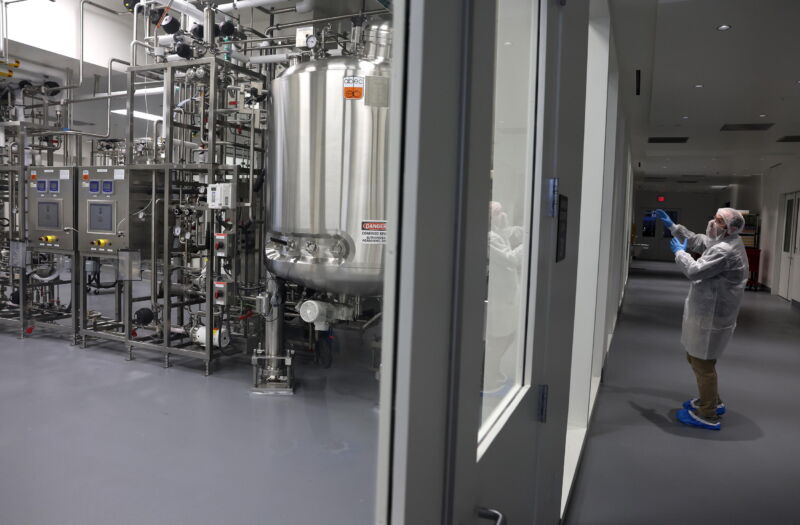Some states are now trying to ban lab-grown meat
Months in jail and thousands of dollars in fines and legal fees—those are the consequences Alabamians and Arizonans could soon face for selling cell-cultured meat products that could cut into the profits of ranchers, farmers, and meatpackers in each state.
State legislators from Florida to Arizona are seeking to ban meat grown from animal cells in labs, citing a “war on our ranching” and a need to protect the agriculture industry from efforts to reduce the consumption of animal protein, thereby reducing the high volume of climate-warming methane emissions the sector emits.
Agriculture accounts for about 11 percent of the country’s greenhouse gas emissions, according to federal data, with livestock such as cattle making up a quarter of those emissions, predominantly from their burps, which release methane—a potent greenhouse gas that’s roughly 80 times more effective at warming the atmosphere than carbon dioxide over 20 years. Globally, agriculture accounts for about 37 percent of methane emissions.
For years, climate activists have been calling for more scrutiny and regulation of emissions from the agricultural sector and for nations to reduce their consumption of meat and dairy products due to their climate impacts. Last year, over 150 countries pledged to voluntarily cut emissions from food and agriculture at the United Nations’ annual climate summit.
But the industry has avoided increased regulation and pushed back against efforts to decrease the consumption of meat, with help from local and state governments across the US.
Bills in Alabama, Arizona, Florida, and Tennessee are just the latest legislation passed in statehouses across the US that have targeted cell-cultured meat, which is produced by taking a sample of an animal’s muscle cells and growing them into edible products in a lab. Sixteen states—Alabama, Arkansas, Georgia, Kansas, Kentucky, Louisiana, Maine, Mississippi, Missouri, Montana, North Dakota, Oklahoma, South Carolina, South Dakota, Texas, and Wyoming—have passed laws addressing the use of the word “meat” in such products’ packaging, according to the National Agricultural Law Center at the University of Arkansas, with some prohibiting cell-cultured, plant-based, or insect-based food products from being labeled as meat.
“Cell-cultured meat products are so new that there’s not really a framework for how state and federal labeling will work together,” said Rusty Rumley, a senior staff attorney with the National Agricultural Law Center, resulting in no standardized requirements for how to label the products, though legislation has been proposed that could change that.
At the federal level, Rep. Mark Alford (R-Mo.) introduced the Fair and Accurate Ingredient Representation on Labels Act of 2024, which would authorize the United States Department of Agriculture to regulate imitation meat products and restrict their sale if they are not properly labeled, and US Sens. Jon Tester (D-Mont.) and Mike Rounds (R-S.D.) introduced a bill to ban schools from serving cell-cultured meat.
But while plant-based meat substitutes are widespread, cell-cultivated meats are not widely available, with none currently being sold in stores. Just last summer, federal agencies gave their first-ever approvals to two companies making cell-cultivated poultry products, which are appearing on restaurant menus. The meat substitutes have garnered the support of some significant investors, including billionaire Bill Gates, who has been the subject of attacks from supporters of some of the state legislation proposed.
“Let me start off by explaining why I drafted this bill,” said Rep. David Marshall, an Arizona Republican who proposed legislation to ban cell-cultured meat from being sold or produced in the state, during a hearing on the bill. “It’s because of organizations like the FDA and the World Economic Forum, also Bill Gates and others, who have openly declared war on our ranching.”
In Alabama, fear of “franken-meat” competition spurs legislation
In Alabama, an effort to ban lab-grown meat is winding its way through the State House in Montgomery.
There, state senators have already passed a bill that would make it a misdemeanor, punishable by up to three months in jail and a $500 fine, to sell, manufacture, or distribute what the proposed legislation labels “cultivated food products.” An earlier version of the bill called lab-grown protein “meat,” but it was quickly revised by lawmakers. The bill passed out of committee and through the Senate without opposition from any of its members.
Now, the bill is headed toward a vote in the Alabama House of Representatives, where the body’s health committee recently held a public hearing on the issue. Rep. Danny Crawford, who is carrying the bill in the body, told fellow lawmakers during that hearing that he’s concerned about two issues: health risks and competition for Alabama farmers.
“Lab-grown meat or whatever you want to call it—we’re not sure of all of the long-term problems with that,” he said. “And it does compete with our farming industry.”
Crawford said that legislators had heard from NASA, which expressed concern about the bill’s impact on programs to develop alternative proteins for astronauts. An amendment to the bill will address that problem, Crawford said, allowing an exemption for research purposes.

Opponents of the ban have said governments shouldn’t interfere with a nascent industry because of unfounded fears over safety concerns.
Pepin Tuma with the Good Food Institute, a nonprofit think tank that works to advance alternative proteins in the food system, spoke at the hearing in opposition to the ban, though he said he’s a “proud meat eater.” The ban will not advance health or safety goals and would stifle innovation, he argued.
“This bill would treat cultivated meat differently than traditional meat without any actual basis in the science and any actual basis in health and safety regulations,” he said.
Tuma also took issue with Crawford’s claim that potential health effects of meat alternatives justify regulation, arguing that other food products have serious long-term negative health impacts yet have not faced bans.
“There are plenty of foods that are not healthy for us that aren’t banned,” Tuma said. “The question is: Should government be the one to come in and tell us what we can or can’t eat?”
Justin Kolbeck, CEO of cultivated seafood company Wild Type, which is working to produce seafood alternatives, told lawmakers that a ban like the one proposed in Alabama would halt the company in its tracks.
“I’m not here to convince you all to buy our products,” he told the committee. “We have our work cut out for us as making seafood that is as delicious and affordable as the best wild-caught seafood is difficult. However, I am here to ask the government to not take away our freedom to decide what to feed ourselves and our families.”
Kolbeck also argued that the ban would advantage foreign businesses over American ones. Unlike beef and chicken, a vast majority of US consumed seafood is imported, deepening US reliance on foreign food products, he said.
“This ban will create Chinese jobs at the expense of small American businesses like mine,” he said.
Even with the proposed amendment to allow research, Kolbeck said the ban could still have serious implications for NASA.
“The problem with cutting out only an exemption for research is that NASA is not going to be in the business of making food products,” Kolbeck said. “We need American companies to make these kinds of products to feed our astronauts, and this industry will die if states like Alabama make it illegal and a criminal misdemeanor for companies like mine to sell our products.”
Only one member of the public, Stephanie Durnin, co-director of an organization called Health Freedom Alabama, spoke in support of the ban.
According to its website, Health Freedom Alabama was founded to support the passage of a bill to ban so-called “vaccine passports” in the state.
“The meat supply of Alabama is complete, whole, real, true, natural. Our membership is very concerned about lab-grown meat,” she said. “Many of our members call it Franken-meat. They want to know that they’re consuming real food from real farmers.”
Arizona bills span from labels to lawsuits
In Arizona, two bills related to the regulation of cell-cultured meat have passed through the State House of Representatives.
HB 2244 has had more bipartisan support, proposing to prohibit substitute meat products—like those grown in a lab or that are made of plants—from being labeled just as meat.
Another bill, HB 2121, would go a step further by prohibiting residents from selling or producing cell-cultured meat in the state and allowing people and businesses harmed by its sale to sue for up to $100,000. The bill passed through the Arizona House of Representatives last month on a party-line vote, with Republicans in support and Democrats in opposition, and now awaits action in the state Senate.
Critics have said the bill would go too far in restricting what people and businesses can buy or sell. “People should have the right, if they choose to, to buy that here in Arizona,” said Rep. Keith Seaman, a Democrat, at the hearing.
Marshall, the legislator who introduced the bill, said he’s a free-market capitalist, but something must be done to protect the agricultural industry from others “seeking to eradicate ranching.”
“This act is necessary to protect this state’s sovereign interests, history, economy, and food heritage,” the legislators wrote at the bottom of the bill, which was co-sponsored by Reps. Selina Bliss, David Cook, John Gillette, and Laurin Hendrix.
Arizona school children for decades were taught the five Cs: Copper, Cotton, Citrus, Climate, and, of course, Cattle. At one point, the state had nearly 2 million head of cattle. That figure has now dropped by half, but cattle farms and ranches are still found throughout the state and generate millions of dollars in revenue.
Maintaining the viability of ranchers, supporters said, is a key aspect of HB 2121.
“What’s the issue with ranching? What’s the issue with cattle?” Marshall asked during a hearing for the bill. “They fart and they burp and it causes too much methane.”
Wyatt Myskow covers environmental news in the Western US from Phoenix as the Roy W. Howard investigative fellow. Wyatt graduated from Arizona State University with his bachelor’s degree in journalism and has previously reported for The Arizona Republic, The Chronicle of Higher Education, and The State Press. He has covered local government, development news, education issues, and the COVID-19 pandemic.
Lee Hedgepeth is Inside Climate News’ Alabama reporter. Raised in Grand Bay, Alabama, a small town on the Gulf Coast, Lee holds master’s degrees in community journalism and political development from the University of Alabama and Tulane University. Lee is the founder of Tread, a newsletter of Southern journalism, and has also worked for news outlets across Alabama, including CBS 42, Alabama Political Reporter, and the Anniston Star. His reporting has focused on issues impacting members of marginalized groups, including homelessness, poverty, and the death penalty. His award-winning journalism has appeared in publications across the country and has been cited by The New York Times, The Wall Street Journal, and The Washington Post, among others.
